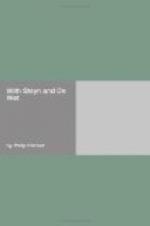Before we woke, however, another waggon came along. Finding the road blocked by ours, the driver roared at us to clear the way immediately. We were not going to rise so early just to please him, so we answered him that if he was in a hurry he could pull the waggon out himself. This he was obliged to do, in order to get past. We then thanked him, and gently told him that if he had addressed us in a decent manner in the beginning he would have spared himself all his trouble. We meekly added the hope that this little lesson would not be lost upon his wayward mind. His remarks cannot be reproduced here, but it was plain that he felt very much as little States do sometimes when taken in hand by one of the great Powers and subjected to a little kind cruelty.
After reloading the waggon we went on, and reached Pieters in due course. The first thing that drew my attention was the sight of one of my young colleagues standing under the verandah of the telegraph office, his face a picture of grief. His father had been killed that morning.
Going a few miles further, I took charge of the telegraph office in Lukas Meyer’s laager. Meyer, a grand-looking man, formerly possessed much influence, being at one time President of the New Republic, a State founded by himself in a tract of country granted him and his followers by a Kafir chief for assistance rendered during an intertribal war. This small republic, soon incorporated with the Transvaal, was thenceforth represented in the First Volksraad by its former president, Louis Botha becoming its member for the Second Chamber. At the battle of Dundee Botha distinguished himself. Meyer did not. Then the former gained fresh laurels at Colenso, and this finally gave him the precedence over Meyer, General Joubert himself, on his death-bed, expressly asking that Botha should be appointed his successor. Meyer, then, was in charge of this laager, Botha had command of the whole line, and Commandant General Joubert was at headquarters near Ladysmith.
Daily the British regiments stormed, and daily they melted away before the fire of our men. The stench arising from the unburied corpses soon made the whole hill reek. The British asked for an armistice to bury their dead, and this was granted by the commandant to whom the request was made. When Botha heard of this he at once informed the enemy that the matter had been arranged without his knowledge, and that he could grant no armistice. I think this is the only case on record where an armistice has ever been refused by us, although armistices were asked for many times by the British.
The combatants, who during the interval had been chatting together most amicably, were quickly recalled to their respective positions, and the slaughter recommenced, continuing until one fine afternoon the enemy took the Krugersdorp commando’s position, thus rendering our whole line untenable. A council of war was immediately called, to take place that evening, as it was impossible for our officers to leave the shelter of their trenches during daylight.




